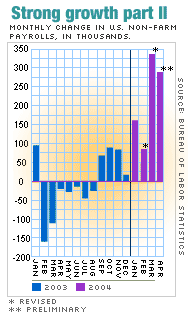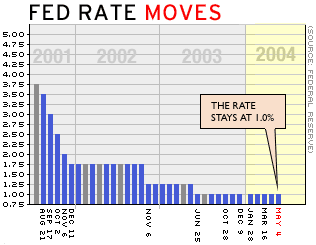NEW YORK (CNN/Money) -
Judging by the big drop in stocks in recent days, you'd think something truly awful had happened to the economy.
Though investors are predictably unhappy about higher interest rates headed this way, some analysts believe Wall Street's mini-panic has gone a little too far, ignoring what could be a sweet spot of stronger economic growth and corporate pricing power, with inflation and interest rates that are well-behaved, historically speaking.
After waiting months and months and months for a job market rebound, the U.S. economy got one in spades in March and April, the best two months of job growth in four years.
Good news? Not for stocks, which traders ditched like hot potatoes on Friday and continued to dump on Monday.
The breadth of Friday's sell-off was impressive -- 90 percent of all shares traded on the New York Stock Exchange closed lower, the third-highest percentage in the past four decades, according to Sundial Capital Research CEO Jason Goepfert. Only the crash of 1987 and another grim day in October 1979 were worse.

Monday morning's action was similarly gloomy, following a brutal sell-off overseas, where Japan's TOPIX had its worst day since Sept. 12, 2001.
The Dow crossed below its 200-day moving average for the first time in a year, and the S&P 500 flirted with its own 200-day average.
The culprit most often cited for this dismal performance? Fear of rising interest rates.
"Now, instead of every bit of good news being hailed as the latest sign of recovery, it is being scorned as another nail in the coffin for easy money," Paul Nolte, director of investments at Hinsdale Associates, wrote in a note to clients.
What would Alfred E. Neuman say?
Higher interest rates can be anathema to stock prices and -- if they go too far, too fast -- to economic growth.
But many analysts note that the Fed's target for the fed funds rate, an overnight bank lending rate that influences borrowing costs throughout the economy, is at its lowest level in more than 40 years, an "emergency" level meant to fight the successive nightmares of a bear market in stocks, a recession, terror attacks, corporate scandals, two wars and prolonged weakness in the job market.

So the emergency is over. And where is Wall Street's "what, me worry" attitude?
"We have to get used to the fact that the emergency level of the fed funds rate is behind us," said Art Hogan, chief market analyst at Jefferies & Co. "The sooner we become cognizant of the fact that the global economy won't be crushed and corporate earnings won't roll over, the sooner the market will fight its way to trend higher."
What's more, if the Fed has its way, then rates won't rise too quickly. Some Fed policy makers believe there's still plenty of flab on the economy that needs to be worked off before runaway inflation becomes a concern.
And if inflation can stay low amid stronger economic growth, then the economy might be in a sort of "Goldilocks" phase -- not too hot, not too cold -- that could be good news for stocks. For a recent example, just take a look at the late 1990s.
"Back before the recession, we had strong job growth and no inflation," said Robert Brusca, chief economist at Fact & Opinion Economics. "There's fuzzy thinking going on here -- I thought we'd broken the old idea that strong growth is bad. As long as productivity growth can remain high, fast job growth is not a problem."
What's more, though aggressive Fed interest-rate hikes in 1994 and 1995 were painful for markets, they didn't damage the U.S. economy.
Bracing for a rebound -- or big trouble
Many analysts think the market has gone way too far and is due for at least a short-term pop. The only question is what happens after that. If the economy is in its sweet spot, then the rebound could last throughout the year.
"Coming off such a low base, higher rates are confirmation we're in an economic growth cycle, as opposed to killing off the growth cycle," said Joe Kalinowski, director of research at Puglisi & Co. "It doesn't deter my confidence in the stock market now."
That's not to say there aren't risks:
- High oil prices are a concern, though in inflation-adjusted dollars, they're not nearly as high as they've been in past "oil shocks."
- Geopolitical risks are an even greater potential worry; if violence should interrupt the flow of oil from the Middle East, then the energy-price shock could be much greater.
- China is another great, big wild card; policy makers there want to reign in its ferocious growth rate, raising the possibility of all kinds of nasty shock waves.
And the Fed might not have quite the handle on inflation it thinks it does. If it's wrong, then the Fed could be playing catch-up in a way that could stomp on the economy and send stocks lower. The faster the Fed hikes, the more suffering there will be, and the greater the risk to the economy and corporate profits.
"Unlike the case a decade ago, I view the coming normalization of Fed policy as a much more serous threat to economic recovery in the U.S. and the broader global economy," Morgan Stanley chief global economist Stephen Roach wrote in a note to clients on Monday, adding that the end of the "carry trade" and the pain to housing, "in conjunction with the negative impacts of higher oil prices, paint an increasingly worrisome picture for the U.S. economy in 2005."

|

